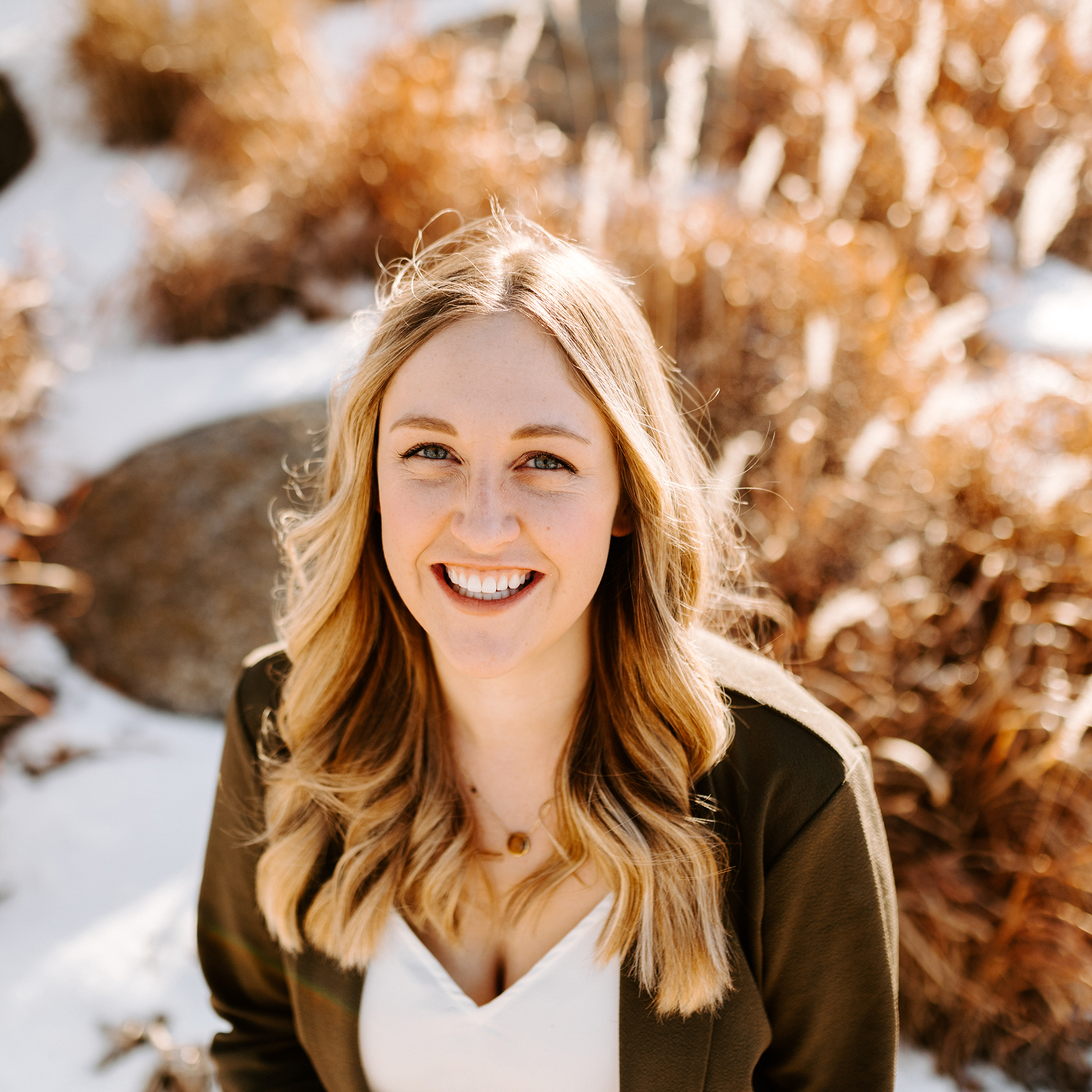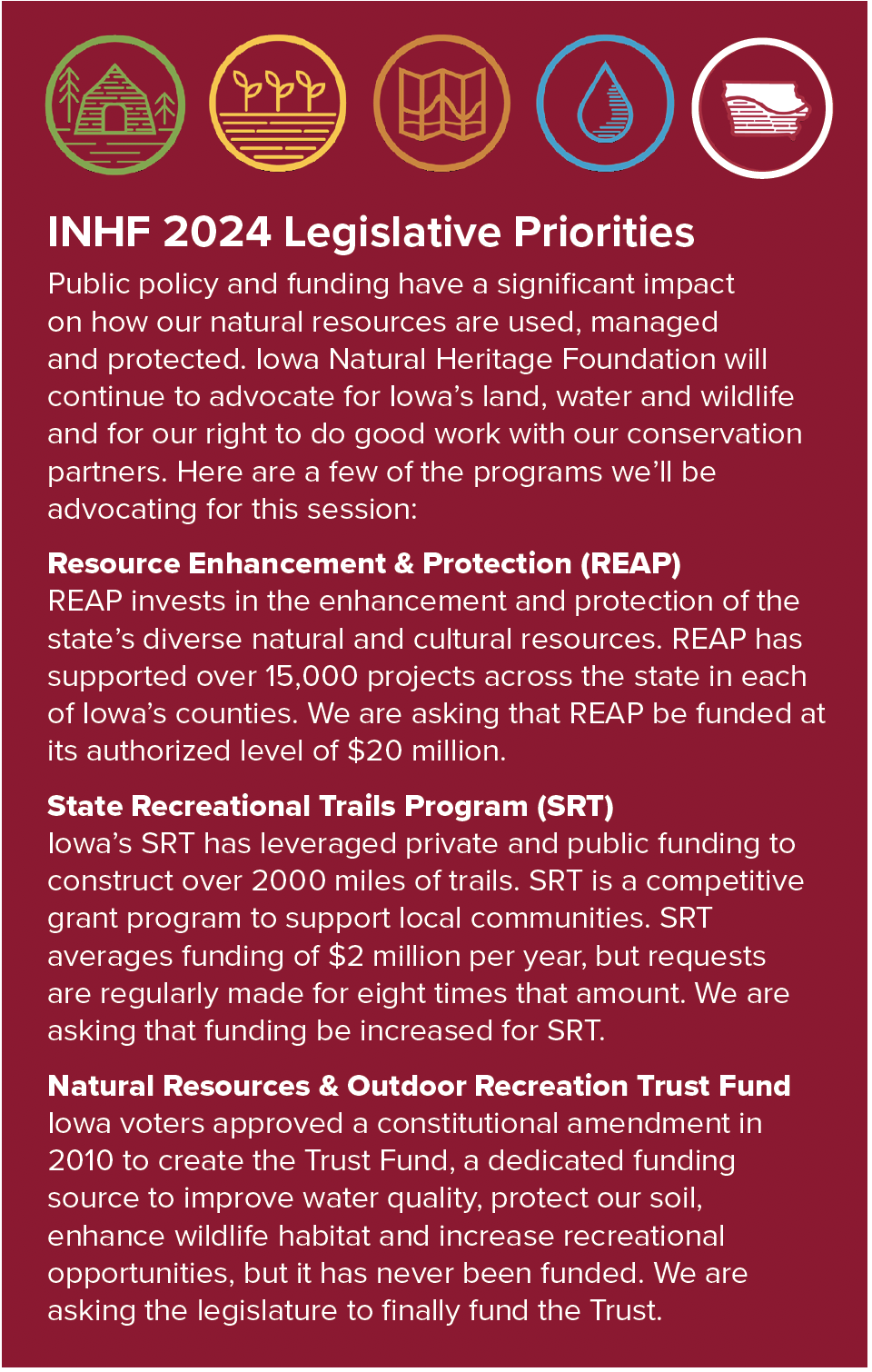Who speaks for nature?
By Joe Jayjack on January 4, 2024 in Blog

What does advocacy for Iowa’s land, water and wildlife look like?
It looks like you.
When you think about the beauty of your favorite place to get outdoors or the necessity of vulnerable plants and animals in our ecosystems, it may seem like these things speak for themselves. But the truth is they need an advocate.
They need someone that can inform lawmakers about the importance of conservation, preserve the programs and policies that work well, and advance new opportunities that enhance our quality of life by investing in our natural resources. They need you.
 “Shaping public policy that reflects our values requires public input,” said Anna Gray, INHF Public Policy Director and Counsel. “Consistent advocacy and engagement are central to creating a vision for our future and lending a voice to the voiceless.”
“Shaping public policy that reflects our values requires public input,” said Anna Gray, INHF Public Policy Director and Counsel. “Consistent advocacy and engagement are central to creating a vision for our future and lending a voice to the voiceless.”
While advocacy can take many forms, it is most effective when it is authentic. Talking directly with your legislators about what you care about — how policies affect you and your community — is the best way to affect change.
INHF speaks up for good conservation policy in Iowa, and we’re fortunate there are many individuals that do the same.
Making a difference
Advocacy seems to come naturally to Heath Stolee, who farms in Hardin County and works at the USDA National Centers for Animal Health in Ames. If there is something he cares about, he talks to the people that can make a difference.
In 2009, Stolee was frustrated by the process veterans like himself had to go through to get financing to buy a home. He worked with State Sen. Annette Sweeney, who represents his district, to introduce a bill that changed the rules for veterans applying for home loans, making it easier for them to get competitive rates and terms. The bill passed unanimously, and Stolee attended the bill signing.
He said most of his advocacy involves “spreading the word of conservation and what it does for the community and the landscape.” Stolee has hosted numerous field days and trips to his farm to showcase the water quality and wildlife benefits of the wetland that was constructed with the help of the Conservation Reserve Enhancement Program (CREP). He regularly invites policymakers and leaders of commodity groups to his farm, and he’s active in habitat protection efforts with his local Pheasants Forever and Ducks Unlimited chapters.
That was why Stolee felt compelled to advocate for nature once again when a bill was introduced last spring that was intended to halt the growth and enhancement of Iowa’s public parks, trails and wildlife areas. Senate File 516 would have created unnecessary burdens for agencies and communities working with willing, private landowners who want to protect land and contribute to Iowa’s open spaces and recreational opportunities.
“In learning about the file that was being headed up in committee by my own state senator, I felt that it was prudent that I go down and speak,” said Stolee, who spoke passionately about how agriculture and conservation can work hand-in-hand, without limiting new opportunities for outdoor recreation. “Conservation and habitat are important to me and it seems that we lose more than we gain every year. We must continue to fight for it!”
The bill passed out of the Senate, but failed to advance in the House despite being introduced in multiple committees. However, it is likely that a similar bill targeting Iowa’s public parks, trails and wildlife areas could be introduced again this year. And Stolee will be ready.
“There has to be a voice for these important issues. In every group, there is someone who steps up and is able to speak for others and share a common vision,” he said. “We have to have habitat on the landscape that is protected for our wildlife to thrive and people to enjoy.”
An evolution in advocacy
Sarah Nizzi grew up on an acreage in Waukee next to her family’s iconic restaurant, Alice’s Spaghettiland. She says that spending time outside has been a staple in her life for as long as she can remember. Her love of nature led her to earn a degree in environmental science and to work in the field, currently as a pollinator conservation specialist with the Xerces Society for Invertebrate Conservation.
While she has always followed political issues, she said that for years her only advocacy was through voting. “I vividly remember voting yes to the create the [Natural Resources and Outdoor Recreation Trust Fund] in 2010,” Nizzi said. “It was not until I was in my late twenties and early thirties I began doing more and paying closer attention to the issues related to conservation. Getting involved with organizations who prioritize policy has helped me stay on track.”
Following issues that affect conservation has allowed Nizzi to stay engaged by having direct conversations with local policymakers, contacting state and federal legislators by email, and attending lobby days at the state Capitol. “It can be difficult to attend lobby days or meet with legislators in person, but making an effort any way you can helps.”
The Trust Fund that Nizzi, along with 63 percent of voters in Iowa, created through a constitutional amendment in 2010 still exists today. But it has never been funded because it requires a sales tax increase of 3/8 of one percent, something the Iowa legislature hasn’t enacted since it was created.
“Advocacy can be time consuming and at times frustrating, but it is critical to be engaged and informed. We can’t give up fighting for conservation,” Nizzi said.
While Nizzi’s advocacy has evolved — including considering running for office herself someday — she says it’s important to continue to be a voice for nature.
“I believe change happens from the ground up. I encourage anyone who values nature to vote at all levels of government. Policy is so important when it comes to preserving nature and advancing conservation and recreation. I would also encourage advocates to consider running for office.”
